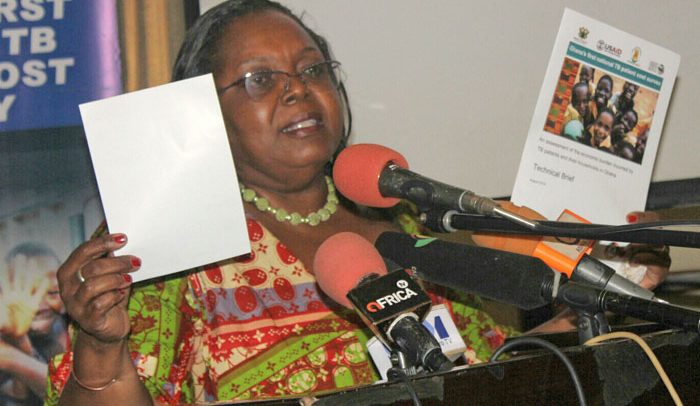Dr. Gloria Quansah Asare with the survey report
The cost incurred by tuberculosis (TB) patients seeking treatment for their illness has left most TB affected families poor, a recent survey indicates.
The TB Patient Cost Survey, the first to be conducted in the country, with the aim of assessing the economic burden incurred by TB patients and their households showed that the median cost that patients incurred per TB episode was $455.
This figure which included direct medical costs (consultation fees, diagnostic tests) and direct non-medical costs (travel, accommodation while seeking care and food) was higher than the monthly household income of the general Ghanaian population which stands at $305.
However, the survey conducted in 23 districts across the country with 691 patients, further showed that treatment for multi-drug resistant (MD) RTB incurred a significantly higher total cost compared to ordinary TB treatment.
“Their costs after diagnosis were three times greater than DS TB. The high costs among the MDR TB were largely attributed to food and/or nutritional supplements outside their normal diet,” the survey stated.
Presenting the key findings of the survey conducted in 2016 in partnership with the London School of Hygiene and Tropical Medicine and the Dodowa Health Research Centre to stakeholders in Accra, Dr. Frank Bonsu, Programme Manager of the National TB Control Programme, said two-thirds of TB affected households face catastrophic cost which implies that they use more than 20 per cent of their monthly income for TB treatment.
He disclosed that half of the TB patients that participated in the survey undertook coping strategies to finance cost as they were unable to pay from existing income alone and they had to rely on saving, borrowing or selling assets.
“Payments for TB care led to a significant increase in the proportion of households that live below the poverty line to 60 per cent,” Dr. Bonsu said.
He said with only 45 per cent of TB patients enrolled on the NHIS and only four on the LEAP programme, there was the need for enhanced social protection for TB patients in Ghana.
Dr. Bonsu, thus, called for enhanced TB care financing, including free TB care policies, systematic nutrition assessment and counselling for all TB patients.
Dr. Owen Kaluwa, World Health Organisation (WHO) country representative, in a statement said no one should get sick and die from TB simply because they cannot access or afford care.
He, therefore, urged the country to use the survey findings to transform the TB response from a conventional public health response to a social response to end TB.
Dr. Gloria Quansah Asare, Deputy Director of the Ghana Health Service (GHS), officially launched the report.
By Jamila Akweley Okertchiri


